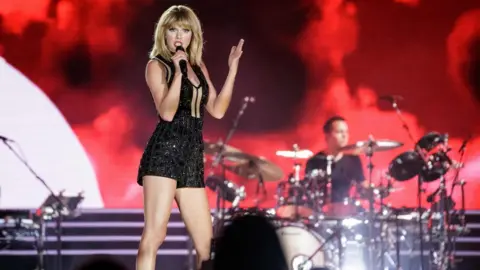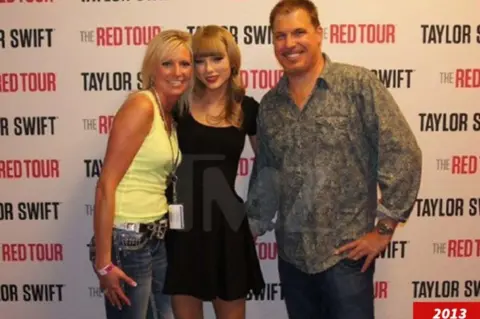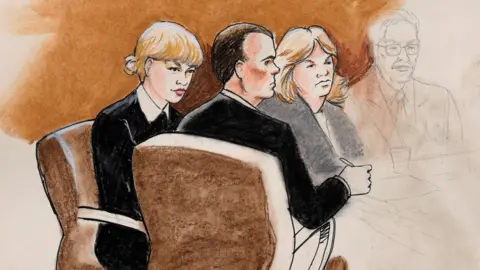Taylor Swift sexual assault case: Why is it significant?
 AFP
AFPUS pop singer Taylor Swift has won a civil case against an ex-DJ who she said grabbed her bottom after putting his hand under her skirt during a pre-concert photo opportunity in 2013.
The case has grabbed headlines for the star's bold testimony in court, and emphasis that she wanted to fight the case not just for herself but for all women who are victimised.
Here are four reasons why it's significant.
1. It highlighted the underreporting of sexual assault
The 2013 incident only became public in 2015 when radio personality David Mueller- who lost his job after Ms Swift's team reported the groping claim to his radio station - filed a defamation lawsuit against Ms Swift.
With the incident out in the open, Ms Swift filed a countersuit alleging sexual assault - which she has just won.
In court, Taylor Swift's mother, Andrea Swift, said she did not go to police when her daughter first told her she had been groped because: "I did not want this event to define her life."
"I did not want her to have to live through the endless memes and gifs that tabloid media and internet trolls decided to come up with - doctoring the pictures… and making her relive this awful moment over and over again," she said.
Ms Swift's lawyer said the star had wanted to keep the situation "discreet and quiet and confidential".
But by not reporting the alleged groping to authorities in the first place, the pop superstar was responding in the same way that thousands of American women do every year.
 TMZ
TMZAccording to RAINN, the largest anti-sexual violence organisation in the United States, two out of three sexual assaults in the country go unreported.
The top three reasons for people not doing so are fearing retaliation, not believing the police will help and considering it to be a "personal matter".
Taylor Swift's reasons for not going to the police, as told by her mother, who is part of her management team, are revealing. The case highlights how some victims fear being ridiculed, not being believed or not being taken seriously after reporting an alleged sexual assault.
2. She refused to back down
The trial showed how some defence lawyers try to undermine the credibility of an alleged victim.
But some of the most potent moments occurred when Taylor Swift refused to let that happen.
At one point, rejecting an accusation that she had misidentified Mueller, she said: "I'm not going to allow you or your client to say I am to blame."
When asked why a photo taken at the time of the alleged incident does not show the front of her skirt ruffled, she bluntly responded: "Because my ass is located on the back of my body."
 Reuters
ReutersAt another moment, she said: "I know exactly who did this. It is not alleged. It is a fact.
"You can ask me a million questions about it and I'm never going to say anything different."
Her testimony drew praise, with Slate magazine's Christina Cauterucci describing it as "sharp, gutsy and satisfying".
"For young fans of Swift's, hearing a beloved artist speak candidly about the emotional damage of sexual assault and stand up to a courtroom of men trying to prove her wrong could be a formative moment for their developing ideas of gender, sex, and accountability," she wrote.
3. It's being seen as a bigger victory
Taylor Swift only asked for a symbolic $1 (77p) in damages from Mr Mueller and has now pledged to donate to organisations that help defend sexual assault victims.
"I acknowledge the privilege that I benefit from in life, in society and in my ability to shoulder the enormous cost of defending myself in a trial like this," she said in a statement following the verdict.
"My hope is to help those whose voices should also be heard."
Her lawyer Douglas Baldridge said she asked only for $1 because she did not want to bankrupt Mr Mueller, but rather use the case to send a message to all women that "they will decide what will be tolerated with their body".
Ms Swift is being praised for inspiring other women to speak out about groping, even if they might not have the advantages she has in terms of wealth, fame and public support.
Allow X content?
Allow X content?
Ten-year-old fan Vega Zaringlee, who attended the trial, told the New York Times that she wanted to thank Ms Swift for standing up for women.
"I now know what honest people talking about a situation that victimised them sound like," she said.
4. In this case the celebrity was the alleged victim, not the alleged perpetrator
We are used to seeing high-profile cases of alleged sexual assault of abuse involving celebrities, but they are often the accused, rather than the accuser.
Of course Taylor Swift is far from the first female pop star to make such allegations.
In fact, she gave $250,000 (£193,000) to the singer Kesha in 2016 to help her pay legal fees in cases against her former producer, whom she accused of sexual assault.
Some brand strategists have suggested that with the civil case, Taylor Swift has been not only trying to empower ordinary women that she doesn't know, but also music industry colleagues.
"Taylor is aware that her defiance in fighting against these allegations - not only made toward her but other artists and colleagues - will achieve global visibility around sexual assault issues that, in many cases, go unreported and ignored and are marginalised," PR strategist Marvet Britto told NBC News.
